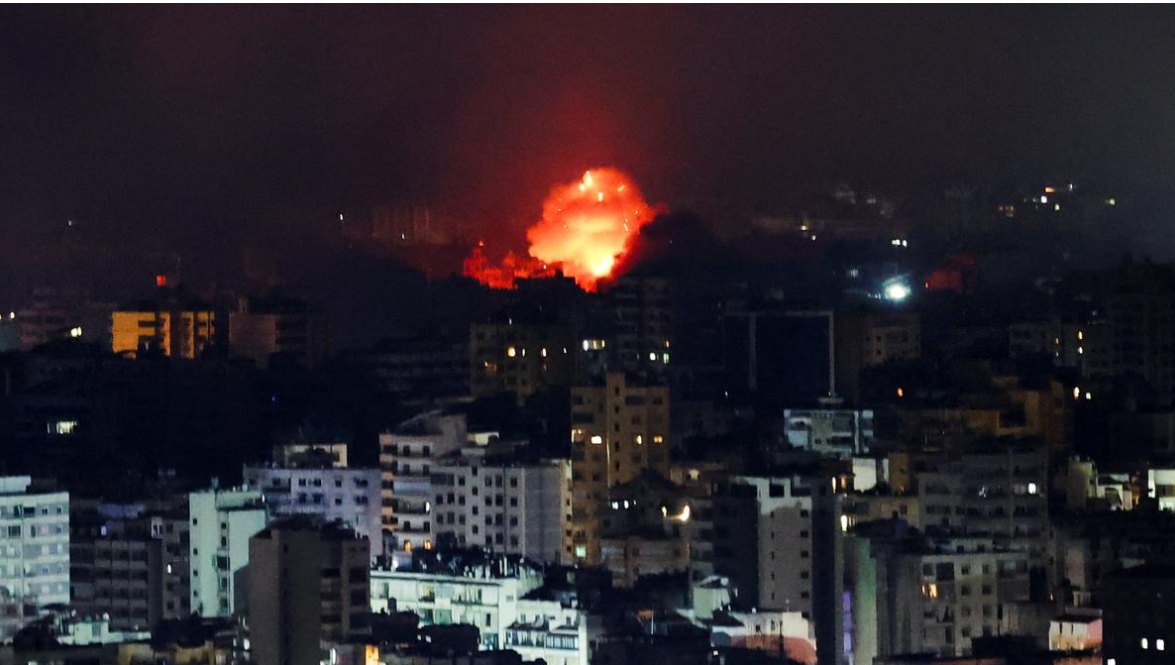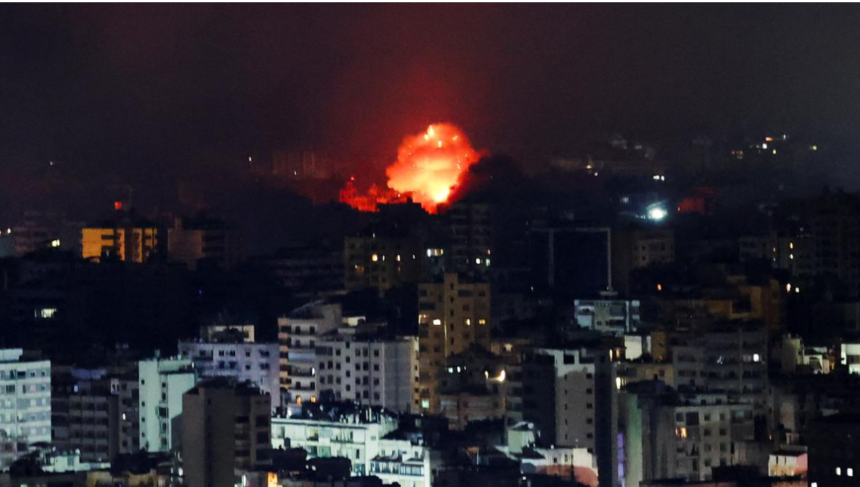The Middle East has witnessed a sharp escalation in violence, with Israel launching airstrikes on central Beirut and Gaza. These military actions have raised the specter of an all-out regional war, particularly as tensions between Israel and Iran continue to rise. In southern Lebanon, Hezbollah has launched several attacks, killing seven Israeli soldiers, further deepening the conflict.
Introduction to the Middle East Crisis
The current escalation in the Middle East represents the latest chapter in a long history of conflict between Israel and its neighbors. Hezbollah, a militant group based in Lebanon with close ties to Iran, has often clashed with Israeli forces. The ongoing violence has roots in decades-old disputes over territory, ideology, and regional dominance. The rising tensions between Israel and Iran, with Hezbollah acting as a key proxy for Iranian interests in the region, have only amplified the potential for a broader conflict. The situation has escalated to a point where the possibility of direct confrontation between Israel and Iran is becoming more real.
Background of the Israel-Hezbollah Conflict
The conflict between Israel and Hezbollah has its origins in the broader Arab-Israeli conflict. Hezbollah was formed in the early 1980s as a response to Israel’s occupation of southern Lebanon, following the Israeli invasion in 1982. Since then, the group has grown into a powerful political and military force in Lebanon, receiving significant support from Iran. Over the years, Hezbollah has carried out numerous attacks against Israeli forces, often in retaliation for Israeli actions in Lebanon or in response to the broader conflict with the Palestinian territories.
Hezbollah’s involvement in the current round of violence can be seen as part of its long-standing opposition to Israeli occupation and its alliance with Iran. The attacks that killed seven Israeli soldiers are just one episode in a series of skirmishes that have taken place along the Israel-Lebanon border. However, the recent escalation has a broader significance because of the wider geopolitical context.
Hezbollah Attacks and Israeli Retaliation
In the latest series of attacks, Hezbollah launched missiles and carried out ambushes targeting Israeli military positions in southern Lebanon. According to Israeli military sources, seven soldiers were killed in two separate attacks. These strikes followed several days of rising tensions, with both sides exchanging fire across the border.
In retaliation, Israel launched a massive bombing campaign, targeting Hezbollah positions as well as infrastructure in central Beirut. The Israeli airstrikes in Beirut mark a significant escalation, as Israel has typically focused its military response on Hezbollah positions in southern Lebanon. The move to strike Beirut has heightened fears of a wider conflict, drawing in other regional actors, including Iran.
Israeli Airstrikes on Gaza
In Middle East addition to the strikes on Lebanon, Israel has also carried out airstrikes on Gaza, where militants have been launching rockets into southern Israel. The situation in Gaza has always been volatile, with frequent flare-ups between Israel and Palestinian militant groups, particularly Hamas. The recent Israeli airstrikes on Gaza are part of a broader strategy to respond to multiple fronts of aggression.
Gaza, already under blockade and suffering from a humanitarian crisis, has seen devastating consequences from the airstrikes. Buildings have been destroyed, and many civilians have been killed or displaced. The simultaneous military campaigns in Gaza and Lebanon have placed significant pressure on Israel’s defense forces, and the situation risks spiraling out of control if additional regional actors become involved.
Iran’s Role in the Escalating Conflict
Iran’s involvement in the Middle East conflict, especially its support for Hezbollah and other militant groups, is one of the most critical factors driving the current crisis. Iran has long sought to extend its influence across the region, using proxies like Hezbollah to challenge Israel and its allies. With the killing of Israeli soldiers by Hezbollah, the question arises whether Iran is directly encouraging these attacks as part of its broader strategy to confront Israel.
The relationship between Iran and Hezbollah is well-documented. Iran provides financial and military support to Hezbollah, seeing it as a crucial ally in the region. Israel, on the other hand, views Iran as its primary adversary, and has consistently sought to undermine Iran’s influence by targeting Hezbollah and other Iranian-backed groups.
Middle East Fears of a broader conflict between Israel and Iran have been growing for years, but the current situation brings that possibility closer to reality. If Iran becomes more directly involved, whether through Hezbollah or by other means, the Middle East could see a war with devastating consequences. 
Potential for an All-Out War
The Middle East has long been a region of geopolitical instability, but the current situation between Israel and Hezbollah, with the involvement of Iran, poses a serious threat of an all-out regional war. Several factors contribute to this heightened risk:
- Israel’s Military Response: Israel’s decision to bomb central Beirut, a significant escalation from previous conflicts, could draw a more substantial response from Hezbollah and its allies.
- Iran’s Support for Hezbollah: Iran’s backing of Hezbollah, both militarily and financially, suggests that any attack on Hezbollah will be viewed as an attack on Iran’s interests.
- Regional Alliances: The complex web of alliances in the Middle East means that any conflict between Israel and Hezbollah could quickly draw in other regional powers, such as Syria, Iraq, and Saudi Arabia.
The Middle East possibility of a full-scale war has raised alarm internationally. While Israel has a powerful military, an extended conflict with Hezbollah, especially one that draws in Iran, would likely lead to significant casualties and destruction across the region.
Impact on Civilians and Humanitarian Concerns
As the violence escalates, civilians are bearing the brunt of the conflict. In both Gaza and Lebanon, Israeli airstrikes have resulted in numerous civilian deaths and widespread destruction of homes and infrastructure. In Gaza, which has already been dealing with a humanitarian crisis due to the blockade and previous conflicts, the situation is becoming increasingly dire.
The international community has expressed concern over the humanitarian impact of the conflict, with calls for a ceasefire and the protection of civilians. However, as both sides continue to exchange fire, it remains unclear whether any diplomatic solution is within reach.
International Reactions to the Crisis
The international community has reacted with alarm to the growing violence in the Middle East. The United Nations has called for an immediate ceasefire, and several world leaders have expressed concern over the potential for a broader war. Western countries, including the United States, have backed Israel’s right to defend itself, while also urging restraint to avoid a wider conflict.
Countries in the region have also responded to the crisis, with some, like Saudi Arabia and Egypt, calling for a diplomatic solution. However, others, particularly those aligned with Iran, have expressed support for Hezbollah’s actions and condemned Israel’s military response.
Diplomatic Efforts and the Role of the United States
As tensions mount, diplomatic efforts to de-escalate the situation are Middle East underway. The United States, which has traditionally been a strong ally of Israel, has been working behind the scenes to prevent the conflict from spiraling into a full-scale war. U.S. officials have been in contact with both Israeli and Lebanese authorities, as well as with Iran, in an effort to broker a ceasefire.
However,Middle East the U.S. faces significant challenges in mediating the conflict. Iran’s influence over Hezbollah means that any resolution will likely require direct negotiations with Tehran, a prospect that remains fraught with difficulty given the longstanding tensions between the U.S. and Iran.
Possible Scenarios Moving Forward
The current situation in the Middle East could play out in several ways, depending on how the key actors respond:
- Escalation into a Full-Scale War: If the violence continues to escalate, the conflict could expand into a full-scale war involving multiple countries. Iran’s involvement, either directly or through Hezbollah, would likely lead to a prolonged and destructive conflict.
- Limited Conflict with Diplomatic Resolution: Another possibility is that the violence remains limited to exchanges between Israel and Hezbollah, with international pressure eventually leading to a ceasefire and a return to the status quo.
- Regional Mediation Efforts: Countries in the region, particularly those with ties to both Israel and Hezbollah, could play a key role in mediating a ceasefire and preventing further escalation.
Conclusion
The situation in the Middle East is rapidly deteriorating, with the potential for a broader regional war growing by the day. Israel’s military response to Hezbollah’s attacks, combined with Iran’s influence in the region, has created a volatile situation that could have far-reaching consequences. As the international community watches closely, efforts to de-escalate the conflict and prevent further bloodshed will be critical. However, with tensions running high and both sides entrenched in their positions, the path to peace remains uncertain. ALSO READ:- The Mobilization of Dalit Support in Haryana’s Electoral Race: Dynamics and Alliances 2024





